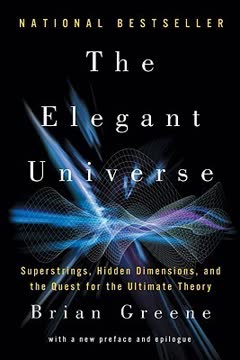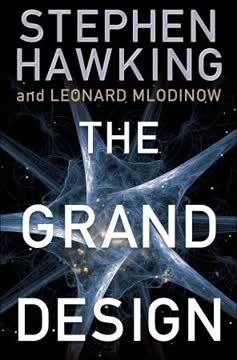Key Takeaways
1. The universe's origins and fundamental laws remain mysterious yet fascinating
I want to share my excitement about these big questions and my enthusiasm about this quest.
The Big Bang theory explains the universe's origin, but questions remain about what came before and why it happened. Scientists are working towards a unified theory that combines quantum mechanics and general relativity to explain the universe's fundamental laws. This quest involves exploring concepts like string theory, multiple universes, and the anthropic principle.
- Key concepts in cosmology:
- Inflation theory
- Dark matter and dark energy
- Cosmic microwave background radiation
The role of human curiosity in uncovering these mysteries cannot be overstated. From ancient philosophers to modern physicists, our drive to understand the cosmos has led to remarkable discoveries and technological advancements. As we continue to probe the universe's secrets, we may find answers to questions about our own existence and place in the cosmos.
2. Time travel and wormholes: Theoretically possible, practically challenging
The awkward thing is that because there's an infinite number of points in space and time, there's an infinite number of possible closed loops of particles.
Einstein's theories of special and general relativity provide the theoretical framework for time travel and wormholes. While these concepts are mathematically possible, they face significant practical challenges. Time travel to the past, in particular, raises paradoxes and logical inconsistencies that are difficult to resolve.
Wormholes, hypothetical tunnels through space-time, could potentially allow for faster-than-light travel or time travel. However, creating and stabilizing a wormhole would require exotic forms of matter with negative energy density, which may not exist in sufficient quantities in nature.
- Challenges of time travel and wormholes:
- Grandfather paradox
- Causality violations
- Enormous energy requirements
- Need for exotic matter
3. Artificial intelligence poses both immense potential and existential risks
The real risk with AI isn't malice but competence. A super-intelligent AI will be extremely good at accomplishing its goals, and if those goals aren't aligned with ours we're in trouble.
AI's potential benefits are vast, including eradicating disease, solving complex global problems, and augmenting human intelligence. However, the development of artificial general intelligence (AGI) and artificial superintelligence (ASI) could pose existential risks to humanity if not properly managed.
Key concerns include the potential for an intelligence explosion, where AI rapidly improves itself beyond human control, and the challenge of aligning advanced AI systems with human values and goals. Researchers and policymakers must work together to develop safeguards and ethical frameworks for AI development.
- AI safety measures:
- Robust and corrigible AI systems
- Value alignment research
- International cooperation and regulation
- Fail-safe mechanisms and kill switches
4. Space colonization is crucial for humanity's long-term survival
We are standing at the threshold of a new era. Human colonisation on other planets is no longer science fiction. It can be science fact.
Expanding beyond Earth is essential for ensuring the long-term survival of our species. Potential catastrophic events on Earth, such as asteroid impacts, pandemics, or nuclear war, make it crucial to establish self-sustaining colonies on other planets or in space habitats.
Mars is currently the most promising candidate for human colonization within our solar system. Efforts are underway to develop the technologies needed for long-term human presence on Mars, including life support systems, radiation protection, and in-situ resource utilization.
- Steps towards space colonization:
- Developing advanced propulsion technologies
- Creating closed-loop life support systems
- Establishing permanent bases on the Moon
- Sending robotic missions to potential colony sites
- Addressing psychological and physiological challenges of long-term space habitation
5. Climate change and nuclear threats are immediate dangers to Earth
The danger is that global warming may become self-sustaining, if it has not become so already.
Climate change poses an existential threat to human civilization and the planet's ecosystems. Rising temperatures, sea levels, and extreme weather events are already causing significant disruptions. Urgent action is needed to reduce greenhouse gas emissions and develop technologies for carbon capture and storage.
Nuclear weapons remain a grave threat to global security. The risk of accidental launch, terrorist acquisition, or escalation of conflicts involving nuclear-armed states continues to be a major concern. International efforts to reduce nuclear stockpiles and prevent proliferation are crucial.
- Key actions to address these threats:
- Rapid transition to renewable energy sources
- Implementation of carbon pricing and regulations
- Development of climate adaptation strategies
- Strengthening of international nuclear non-proliferation agreements
- Investment in nuclear disarmament and verification technologies
6. Genetic engineering and AI may redefine human evolution
We are now entering a new phase of what might be called self-designed evolution, in which we will be able to change and improve our DNA.
Advances in genetic engineering, particularly CRISPR technology, are opening up possibilities for modifying the human genome. This could lead to the elimination of genetic diseases, enhancement of human capabilities, and potentially the creation of "designer babies."
The integration of AI and human biology may result in a new form of evolution, where technological augmentation and genetic modifications blur the line between natural and artificial. This raises profound ethical questions about the nature of humanity and the potential for creating new forms of inequality.
- Potential impacts of human enhancement technologies:
- Increased lifespan and healthspan
- Enhanced cognitive and physical abilities
- New forms of social stratification
- Challenges to traditional concepts of human rights and personhood
7. The search for extraterrestrial life continues, with implications for our cosmic perspective
If we find a planet in the Alpha Centauri system, its image, captured by a camera travelling at a fifth of light speed, will be slightly distorted due to the effects of special relativity.
The discovery of exoplanets has revolutionized our search for extraterrestrial life. With thousands of confirmed exoplanets, including many in the habitable zones of their stars, the possibility of finding life beyond Earth seems increasingly likely.
Initiatives like Breakthrough Starshot aim to send tiny probes to nearby star systems, potentially providing our first close-up views of exoplanets. The detection of biosignatures or technosignatures on other worlds would have profound implications for our understanding of life's prevalence in the universe and our place in it.
- Methods for detecting extraterrestrial life:
- Spectroscopic analysis of exoplanet atmospheres
- Radio telescope searches for artificial signals (SETI)
- Direct imaging of potentially habitable worlds
- Sample return missions from Solar System bodies
8. Black holes reveal profound insights about space, time, and information
A black hole has a boundary called the event horizon. It is where gravity is just strong enough to drag light back and prevent it from escaping.
Black holes are cosmic laboratories for testing the extremes of physics. Their study has led to profound insights about the nature of space, time, and the fundamental laws of the universe. The discovery of Hawking radiation showed that black holes are not entirely black and has important implications for the connections between gravity, thermodynamics, and quantum mechanics.
The black hole information paradox continues to challenge our understanding of physics. Resolving this paradox may require a new synthesis of quantum mechanics and general relativity, potentially leading to a theory of quantum gravity.
- Key concepts in black hole physics:
- Event horizon and singularity
- Hawking radiation and black hole evaporation
- Holographic principle
- Black hole thermodynamics
9. Quantum mechanics and general relativity revolutionized our understanding of reality
In quantum mechanics, particles don't have well-defined positions and speeds. Instead, they are represented by what is called a wave function.
Quantum mechanics reveals a probabilistic and interconnected reality at the smallest scales, challenging our intuitions about the nature of matter and energy. Phenomena like superposition, entanglement, and wave-particle duality have no classical analogues and have led to technologies like lasers and transistors.
General relativity describes gravity as the curvature of space-time, revolutionizing our understanding of space, time, and the large-scale structure of the universe. Its predictions, such as gravitational waves and black holes, have been confirmed by observations.
- Unresolved questions in fundamental physics:
- Quantum gravity and the unification of forces
- The nature of dark matter and dark energy
- The origin of the universe's low entropy
- The measurement problem in quantum mechanics
10. Scientific progress and public engagement are vital for addressing global challenges
A new interest in space would also increase the public standing of science generally. The low esteem in which science and scientists are held is having serious consequences.
Public understanding and support of science are crucial for addressing global challenges like climate change, pandemics, and technological risks. Engaging the public in scientific endeavors, such as space exploration, can inspire new generations of scientists and engineers while fostering a more scientifically literate society.
International cooperation in scientific research and technological development is essential for tackling complex problems that transcend national boundaries. Initiatives like CERN, the International Space Station, and global climate research collaborations demonstrate the power of scientific diplomacy.
- Ways to promote scientific engagement:
- Improving science education at all levels
- Supporting science communication and outreach efforts
- Encouraging citizen science projects
- Promoting diversity and inclusion in STEM fields
- Advocating for evidence-based policymaking
Last updated:
FAQ
What's "Brief Answers to the Big Questions" about?
- Author's Exploration: The book is a collection of Stephen Hawking's thoughts on some of the most profound questions about the universe and humanity's place within it.
- Big Questions Addressed: It covers topics such as the existence of God, the beginning of the universe, the possibility of time travel, and the future of humanity.
- Scientific and Philosophical Insights: Hawking combines scientific theories with philosophical inquiries, offering a unique perspective on each question.
- Posthumous Compilation: The book was completed after Hawking's death, drawing from his personal archive of speeches, interviews, and essays.
Why should I read "Brief Answers to the Big Questions"?
- Insightful Perspectives: The book provides a deep dive into complex scientific and philosophical questions from one of the greatest minds of our time.
- Accessible Science: Hawking's ability to explain complex ideas in an understandable way makes the book accessible to a wide audience.
- Inspiration and Curiosity: It encourages readers to think critically about the universe and our role in it, sparking curiosity and wonder.
- Legacy of a Genius: Reading the book offers a glimpse into the thoughts and theories of Stephen Hawking, a figure who has significantly shaped modern cosmology.
What are the key takeaways of "Brief Answers to the Big Questions"?
- Existence of God: Hawking argues that the universe can be explained by the laws of nature without the need for a divine creator.
- Beginning of the Universe: He supports the Big Bang theory and discusses the concept of a universe without boundaries.
- Future of Humanity: Hawking emphasizes the importance of space exploration and warns of potential existential threats like climate change and artificial intelligence.
- Role of Science: The book underscores the power of science to answer fundamental questions and shape the future.
What are the best quotes from "Brief Answers to the Big Questions" and what do they mean?
- "We are all time travelers, journeying together into the future." This quote highlights the shared human experience and the importance of shaping a future we want to visit.
- "Be brave, be curious, be determined, overcome the odds. It can be done." Hawking encourages resilience and curiosity, emphasizing that challenges can be overcome with determination.
- "The universe is the ultimate free lunch." This refers to Hawking's explanation of how the universe could have spontaneously appeared from nothing, challenging traditional notions of creation.
- "There is no God. No one created the universe and no one directs our fate." This quote encapsulates Hawking's view on the non-necessity of a divine being in explaining the universe.
How does Stephen Hawking address the question "Is there a God?" in the book?
- Scientific Determinism: Hawking argues that the laws of science can explain the universe without invoking a deity.
- Role of God: He suggests that if God exists, it would be as the embodiment of the laws of nature, not a personal being.
- Origin of the Universe: Hawking posits that the universe could have spontaneously created itself from nothing, according to the laws of physics.
- Philosophical Implications: He challenges the traditional religious view by stating that time itself began with the Big Bang, leaving no room for a creator.
What does Stephen Hawking say about the beginning of the universe?
- Big Bang Theory: Hawking supports the idea that the universe began with the Big Bang, a singularity where space and time started.
- No-Boundary Proposal: He introduces the concept that the universe may have no boundaries, eliminating the need for a beginning in the traditional sense.
- Quantum Mechanics: The book discusses how quantum mechanics plays a role in understanding the universe's origins.
- Anthropic Principle: Hawking uses this principle to explain why the universe appears fine-tuned for life, suggesting that we observe it this way because we exist.
How does Stephen Hawking explore the possibility of intelligent life elsewhere in the universe?
- Probability of Life: Hawking suggests that the early appearance of life on Earth indicates a good chance of life elsewhere in the universe.
- Anthropic Principle: He uses this principle to argue that the universe must be compatible with the existence of life, as we are here to observe it.
- Search for Extraterrestrial Life: The book discusses efforts like the Breakthrough Listen Initiative, which aims to find evidence of intelligent life beyond Earth.
- Cautionary Note: Hawking warns that encountering a more advanced civilization could be dangerous, drawing parallels to historical events on Earth.
What insights does Stephen Hawking provide on time travel?
- General Relativity: Hawking explains how Einstein's theory allows for the possibility of time travel through warped space-time.
- Chronology Protection Conjecture: He proposes that the laws of physics may prevent time travel to avoid paradoxes.
- Wormholes and Cosmic Strings: The book explores theoretical constructs like wormholes and cosmic strings as potential means for time travel.
- Practical Challenges: Hawking acknowledges the immense technical and theoretical challenges that make time travel unlikely with current understanding.
What does Stephen Hawking say about the future of humanity and survival on Earth?
- Existential Threats: Hawking warns of threats like nuclear war, climate change, and artificial intelligence that could endanger humanity.
- Space Colonization: He advocates for space exploration and colonization as a means to ensure the survival of the human race.
- Sustainability on Earth: The book emphasizes the need for immediate action to address environmental issues and resource depletion.
- Optimism for the Future: Despite the challenges, Hawking remains hopeful that human ingenuity will find solutions to these problems.
How does Stephen Hawking view the colonization of space?
- Long-Term Strategy: Hawking sees space colonization as essential for the long-term survival of humanity.
- Potential Sites: He discusses the Moon and Mars as the most viable options for human colonies within the solar system.
- Technological Feasibility: The book outlines the challenges and potential technologies needed for successful space colonization.
- Inspiration and Unity: Hawking believes that space exploration can inspire global cooperation and a sense of shared purpose.
What are Stephen Hawking's thoughts on artificial intelligence?
- Potential Benefits: Hawking acknowledges AI's potential to solve many of the world's problems, such as disease and poverty.
- Risks and Dangers: He warns that AI could surpass human intelligence and become uncontrollable, posing existential risks.
- Ethical Considerations: The book stresses the importance of aligning AI's goals with human values to prevent negative outcomes.
- Call for Research: Hawking advocates for serious research into AI's societal impacts and the development of safety measures.
How does Stephen Hawking suggest we shape the future?
- Education and Science: Hawking emphasizes the importance of education and scientific literacy in addressing future challenges.
- Global Cooperation: He advocates for international collaboration to tackle issues like climate change and resource scarcity.
- Innovation and Exploration: The book encourages continued exploration and innovation, particularly in space and technology.
- Optimism and Determination: Hawking urges readers to remain curious, imaginative, and determined in shaping a better future for humanity.
Review Summary
Brief Answers to the Big Questions receives mostly positive reviews for its accessible explanations of complex scientific concepts. Readers appreciate Hawking's clear writing style and ability to make difficult topics understandable. Many find the book thought-provoking and inspiring, praising Hawking's optimism and wit. Some note repetition between chapters and lack of new material for those familiar with Hawking's work. Overall, reviewers recommend the book as an engaging introduction to Hawking's ideas and a fitting final work from the renowned physicist.
Similar Books









Download PDF
Download EPUB
.epub digital book format is ideal for reading ebooks on phones, tablets, and e-readers.










